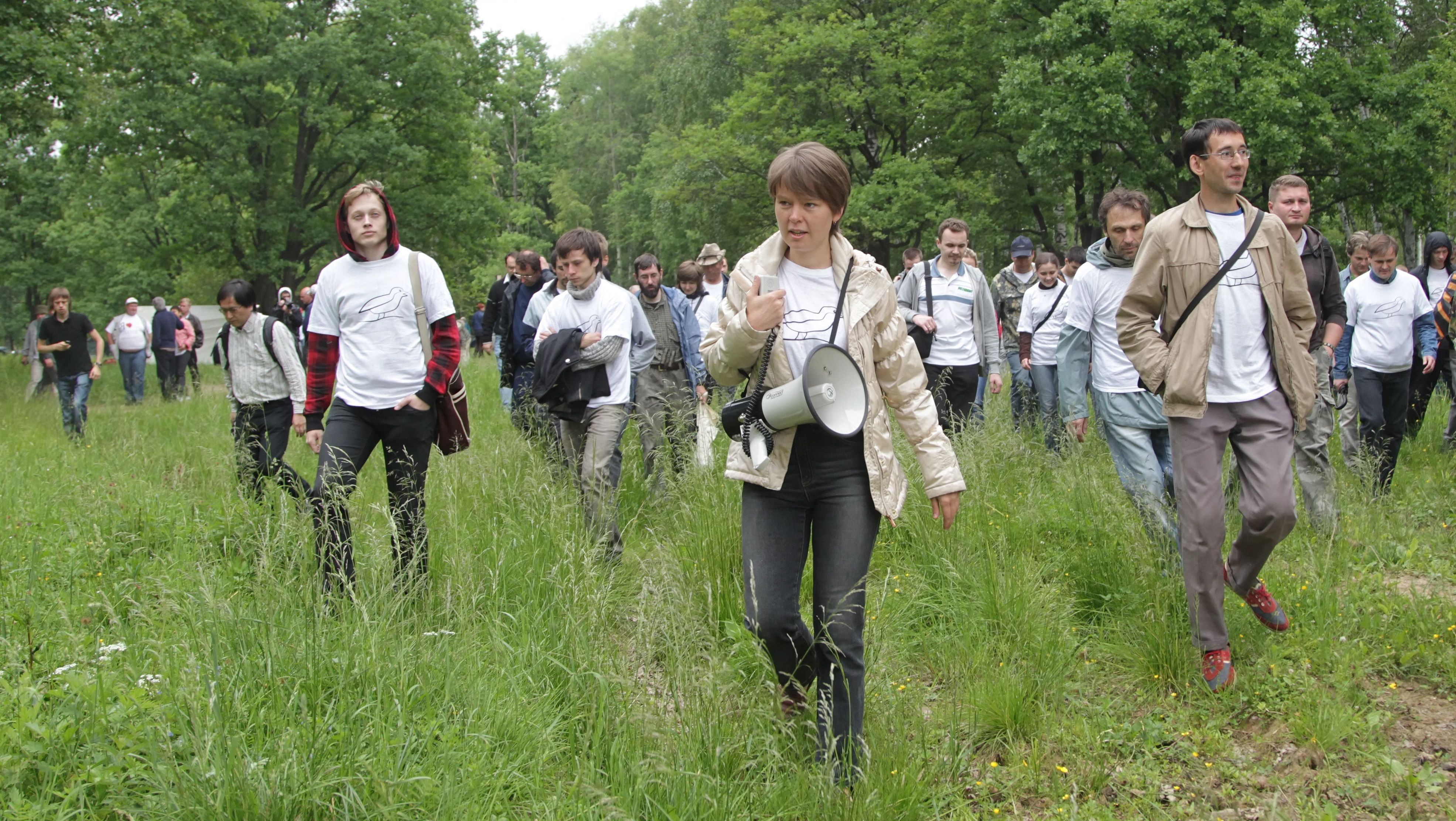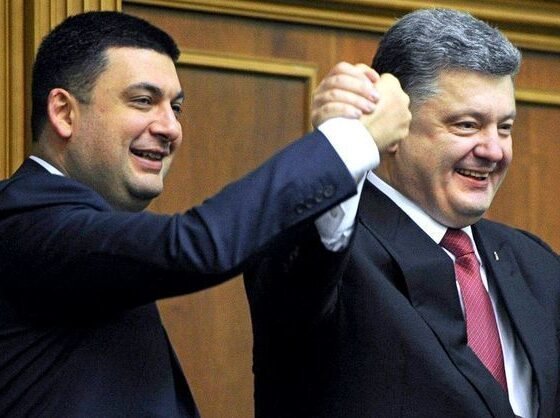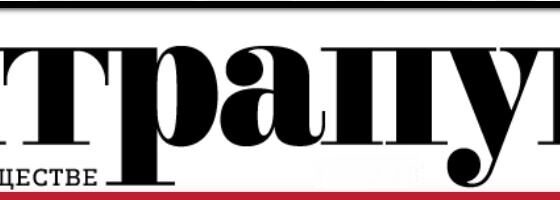
Yevgenia Chirikova (above), one of the leaders of the Khimki Forest Defenders, marches during a protest in the Khimki Forest outside Moscow, 2011.
► New independent municipal deputies embody the new face of Russian politics and confirm the vibrancy of Russian society at the grassroots level, helping to make up for the failure of state structures to come up with innovative solutions.
Putin’s successful re-election to a fourth presidential term in March 2018 should not obscure the deep transformations underway in Russian society and the latter’s relationship to politics. To secure its legitimacy and increase its managerial efficiency in a time of stagnation, the regime has had to introduce several changes. Since 2015, about 20 of the 85 governors have been dismissed. Furthermore, a growing number of political personnel have also been arrested, with particularly high turnover rate within the Ministry of Interior. Even some economic elites and important figures in Putin’s inner circles have lost their positions.
|
“An emerging trend has been the rise of spaces of freedom at the local level, epitomized by vibrant grassroots initiatives, both civic and charitable.”
|
Another emerging trend has been the rise of spaces of freedom at the local level, epitomized by vibrant grassroots initiatives, both civic and charitable. Linked to that latter trend but separated from it has been the election of 260 independent candidates in the Moscow 2017 municipal elections—a record 18% of all candidates. The capital may be at the forefront of this trend, but it is far from alone: several other provincial cities, from St. Petersburg and Yekaterinburg to Pskov and Kaluga, have seen the rise of these new politicians.
Who are these new faces of Russian politics? They are usually between 35 and 50 years old, and a high proportion of them are women. Some are former members of liberal parties—such as Grigory Yavlinsky’s Yabloko, the Union of Right Forces (key members of which have included Anatoly Chubais, Boris Nemtsov, and Yegor Gaidar), and Vladimir Milov’s Democratic Choice—or are close to Alexei Navalny, but have left traditional party structures disappointed and decided to run as independents. Some of them have gone through the “School of New Power” (Shkola novoi vlasti) launched by Alexei Kudrin, in 2012, to renew the base of political candidates and connect with grassroots activism. Others are newcomers to politics and first-time candidates; typically, these individuals were involved in local activism before deciding to run for office.
|
“Local activism has been on the rise in Russia over the past decade and took a decisive turn with the massive wildfires in 2010.”
|
Local activism has been on the rise in Russia over the past decade and took a decisive turn with the massive wildfires in 2010, which pushed thousands of people to organize grassroots relief operation, act collectively, and engage in crowdfunding through social media. Since then, several other state decisions have sparked popular protests: the deforestation of Khimki to allow for the construction of a new highway, the demolition of the Khrushchevki (the concrete-paneled or brick three- to five-story apartment buildings constructed in the 1950s-60s) in Moscow, the sale of the last remaining pieces of land in Moscow and its suburbs for elite-oriented construction of luxurious dachas, etc. Big manufacturing plants in Chelyabinsk and Krasnoyarsk have also faced protests, mostly for environmental reasons.
Of course grassroots activism and local elections are two different fields of action. Municipal deputies have limited room of maneuver: they have no tax base, discretionary power over budget or regulatory authority, thus, meaning their impact on decision-making remains low. By controlling the regional level and the Duma very thoroughly, the Kremlin can let the municipal level have more autonomy because it has little power, but also because it needs new faces to emerge, with good managerial skills, and to offer at least some competition. At the same time, the regime keeps its full capacity to neutralize these independent candidates if some of them were to become too challenging.
Yana Gorokhovskaia has been studying these new independent deputies:

Read Yana’s PONARS Eurasia Policy memo here.
Several of these independent deputies visited Washington, D.C. in early May at the invitation of the Free Russia Foundation. Their stories and perspectives offer a unique insight into Russia’s vivid local politics. All recognize that their goal is not to speak to the 14-16% of people who identify themselves as “liberals,” but rather to connect with the 80% of the population that supports the regime and thus transform the population’s vision of politics and politicians. The deputies want to embody another way of doing politics; they invite people to see politicians as individuals who are accountable to their electorate for their decisions.
|
“The vibrancy of local politics in today’s Russia calls to mind the grassroots activism of the perestroika years.”
|
Some deputies criticized liberal parties, seeing in them the same nomenklatura and clientelist mechanisms as in mainstream parties. Others were more positive but disagreed with liberals’ strategy of focusing on presidential and national legislative elections rather than local-level ones. As one MP put it, Navalny and Volkov (his close associate) want to conquer the presidency in order to change the country from the top down, whereas independent deputies believe that the winning at the local level is the first step toward genuine change and local-level victory is indispensable to the attainment of national-level power. All of them support the creation of an interest-based coalitions that would transcend ideological cleavages; accordingly, they have cooperated with other regime opponents, nationalists, monarchists, and representatives of United Russia alike.
The vibrancy of local politics in today’s Russia calls to mind the grassroots activism of the perestroika years when society took advantage of each weakness of the system to empower itself. It is also the product of a new generation of Russian citizens that rejects a paternalist state-society relationship and, not seeking anything from the state, takes its destiny into its own hands.

Two crucial issues/questions will decide the future of this wave of independent politicians:
► The changing boundary between “politics” and “non-politics” in Russia: will the regime continue to consider local politics and social activism as a form of non-politics that does not threaten the broader political status quo?
► The ability of these new societal actors to progressively move from the local level to conquer the regional level. This would mean dealing with new issues, such as the need to forge alliances with parties or financial backers in order to acquire more consistent campaign funding, with all the possible risks to “independence” that this entails.
Whatever their future political trajectory, these independent, elected politicians embody the new face of Russian politics and confirm the vibrancy of Russian society at the grassroots level, helping to make up for the failure of state structures to come up with innovative solutions.


Yana Gorokhovskaia (left) is a Postdoctoral Fellow in Russian Politics at the Harriman Institute for Russian, East European and Eurasian Studies at Columbia University.
Marlene Laruelle (right) is Associate Director and Research Professor at IERES, Elliott School of International Affairs, The George Washington University.
Image one credit: Maxim Shipenkov | Image two credit: Daniel Beilinson











